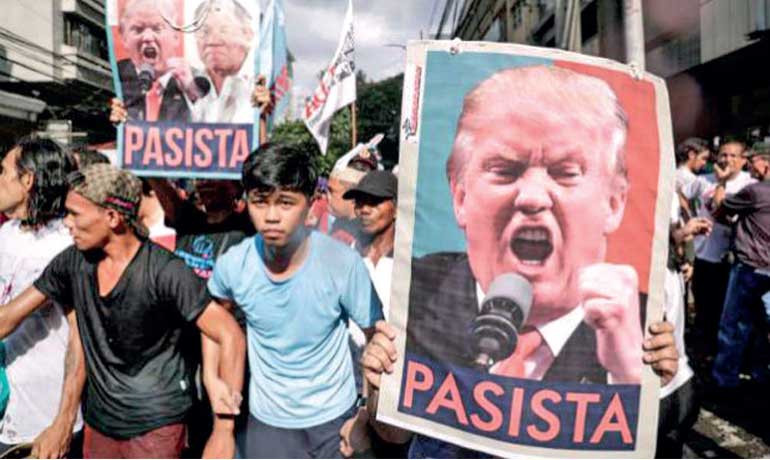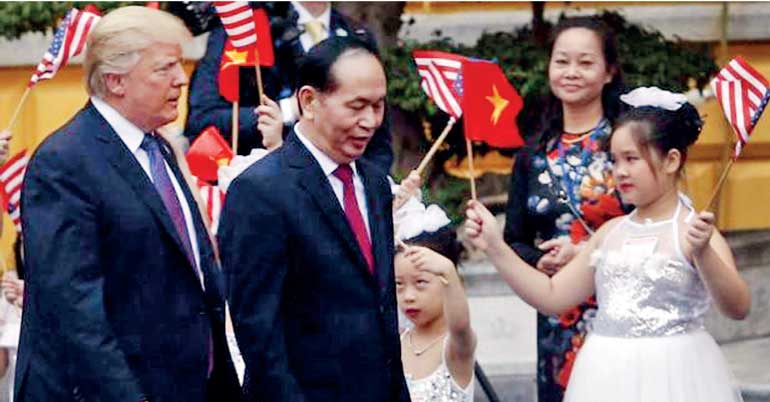Wednesday Feb 25, 2026
Wednesday Feb 25, 2026
Monday, 13 November 2017 00:00 - - {{hitsCtrl.values.hits}}
DANANG, Vietnam (Reuters): Asia-Pacific leaders agreed on Saturday to address “unfair trade practices” and “market distorting subsidies” in a statement that bore the imprint of US President Donald Trump’s efforts to reshape the global trade landscape.
The summit of Asia-Pacific Economic Cooperation (APEC) countries in Vietnam has put on show the contrasting vision of Trump’s “America First” policy with the traditional consensus favouring multinational deals that China now seeks to champion.
On the sidelines of the APEC summit, 11 countries kept alive a Trans Pacific trade deal whose future has been in doubt since Trump withdrew from it early this year in the name of protecting American jobs.
A joint statement issued by the 21 APEC countries contrasted sharply with the group’s communique from last year.
“We will work together to make trade more inclusive, support improved market access opportunities, and address unfair trade practices,” the statement read. “We urgently call for the removal of market-distorting subsidies and other types of support by governments and related entities.”
The comments echoed Trump’s own themes in an address in the resort city of Danang.
So did a mention of the importance of bilateral trade deals alongside bigger agreements and a call to improve the World Trade Organization (WTO). The 2016 statement was not critical of the WTO.
Trump says that the United States has lost out because other countries do not play by the rules, using state subsidies and measures that distort trade to the extent that Asian countries have built huge trade surpluses – China’s the biggest of all.
Earlier in the week, trade and foreign ministers wrangled over the language to be used in APEC statements. Officials said the 20 other countries had been pitted against a US push to change the traditional wording.
Those countries still managed to ensure references to pushing for free trade and fighting protectionism - core reasons for APEC’s founding in 1989 – made it into the final statement.
Trans Pacific deal lives
In a boost for the principle of multilateral trade pacts, countries in the Trans Pacific Partnership (TPP) trade deal agreed on the core elements to move ahead without the United States.
Their talks had looked in doubt in the face of last minute resistance from Canada, but ministers announced they were near agreement on a deal they rebaptised the Comprehensive and Progressive Agreement for Trans-Pacific Partnership (CPTPP).
Japanese Economy Minister Toshimitsu Motegi said he hoped that moving ahead with the deal would be a step towards bringing back the United States.
Partly to counter China’s growing dominance in Asia, Japan had been lobbying hard for the TPP pact, which aims to eliminate tariffs on industrial and farm products across the 11-nation bloc whose trade totalled $356 billion last year.
Some 20 provisions of the original agreement were suspended. Those included some related to protecting labour rights and the environment, although most were related to intellectual property – one of the main sticking points after the US withdrawal.
Canada, which has the second-biggest economy among remaining TPP countries after Japan, had said it wanted to ensure an agreement that would protect jobs.
Chinese President Xi Jinping said APEC members needed to remain true to the group’s founding purposes, which included advancing trade, liberalisation and strengthening the multilateral trade regime, China’s Xinhua news agency said.
He spoke in favour of an ambitious free trade area that covers the entire region.
“We need to take determined steps toward a Free Trade Area of the Asia-Pacific in line with the agreed roadmap, and herald a new round of development in the Asia-Pacific in the course of opening up,” he said.
 The Secretary for Commerce and Economic Development, Mr Edward Yau (sixth left), is pictured with other ASEAN trade ministers at the 2nd Association of Southeast Asian Nations (ASEAN) Economic Ministers - Hong Kong, China Consultations in Manila, the Phil
The Secretary for Commerce and Economic Development, Mr Edward Yau (sixth left), is pictured with other ASEAN trade ministers at the 2nd Association of Southeast Asian Nations (ASEAN) Economic Ministers - Hong Kong, China Consultations in Manila, the Phil
MANILA (Reuters): Hong Kong on Sunday signed free trade and investment pacts with the ten-nation Association of Southeast Asian Nations, in what one of the Chinese territory’s senior officials called a “loud and clear” vote against rising regional trade protectionism.
The pacts conclude nearly three years of talks, are expected to take effect on January 1 at the earliest, and aim to bring “deeper and bolder” integration of market access with the bloc, said Edward Yau, Hong Kong’s commerce and development secretary.
“In the face of protectionist sentiments in other parts of the world, these two agreements are in fact a loud and clear vote from all of us here for freer and more open trade,” Yau said.
“Hong Kong, being a free trade promoter and advocate of a strong, rule-based multilateral trading system, will continue to take this pathway, continue to do our utmost.”
Total merchandise trade between Hong Kong and ASEAN was HK$833 billion ($107 billion) last year, official figures show. Total services trade was HK$121 billion ($16 billion) in 2015.
The ASEAN Hong Kong China Free Trade Agreement (AHKCFTA) was signed on the sidelines of a summit of the regional grouping in the Philippine capital of Manila.
It came after leaders attending an Asia-Pacific Economic Cooperation (APEC) summit in Vietnam agreed to tackle “unfair trade practices” and “market distorting subsidies” in a statement on Saturday that bore the imprint of US President Donald Trump’s efforts to reshape the global trade landscape.
That summit offered a contrast between the vision of US President Donald Trump’s “America First” policy and a traditional consensus favoring multinational deals that China now seeks to champion.
While Hong Kong already has one of the world’s freest and most open economies, the pacts will see many ASEAN countries gradually eliminate or slash customs duties on goods from the former British colony that returned to Chinese rule in 1997.
Professional services are also expected to benefit, with increased investment flows, Yau added.
The ASEAN grouping includes Brunei, Cambodia, Indonesia, Laos, Malaysia, Myanmar, the Philippines, Singapore, Thailand and Vietnam.

Activists hold placards with the images of US President Donald J. Trump and Philippine President Rodrigo Duterte during a protest near the US embassy in Manila, Philippines, on Sunday
MANILA (Reuters): Riot police used water canon to prevent hundreds of protesters reaching the US embassy in Manila on Sunday, just a few hours before the arrival of President Donald Trump in the Philippines for a regional summit and the last leg of his Asia tour.
Carrying placards declaring “Dump Trump” and “Down with US Imperialism”, the left-wing protesters were blocked by police in riot gear with shields and batons, and then showered with jets of water from a fire engine.
“Trump is the CEO of the imperialist government of the US, said 18-year-old student Alexis Danday after the protesters were scattered. “We know he is here to push for unfair treaties between the Philippines and
the US.”

US President Donald Trump and Vietnamese President Tran Dai Quang attend a welcoming ceremony at the Presidential Palace in Hanoi on Sunday. (EPA-EFE photo)
Reuters: Vietnamese and US companies on Sunday signed memorandums of understanding on gas development, automobiles, as well as aircraft engine purchase and support during US President Donald Trump’s visit to Vietnam.
PetroVietnam Gas GAS.HM and AES Corp signed a memorandum of understanding on Son My liquefied natural gas terminal project and an MoU with Alaska Gasline Development Corp on gas supply and upstream investment.
Pratt & Whitney Co signed an engine purchase support agreement and binding MoU for the sale and maintenance of its engines with Vietnamese flag carrier Vietnam Airlines.
The US engine maker also signed a purchase and support agreement for 20 engines with Vietjet Aviation JSC.
US truck maker Navistar International Corp signed an MoU on commercial truck business with Vietnamese Hoang Huy Joint Stock Co.
No details were available on the value of the deals, which were signed in the presence of Trump and his Vietnamese counterpart Tran Dai Quang.